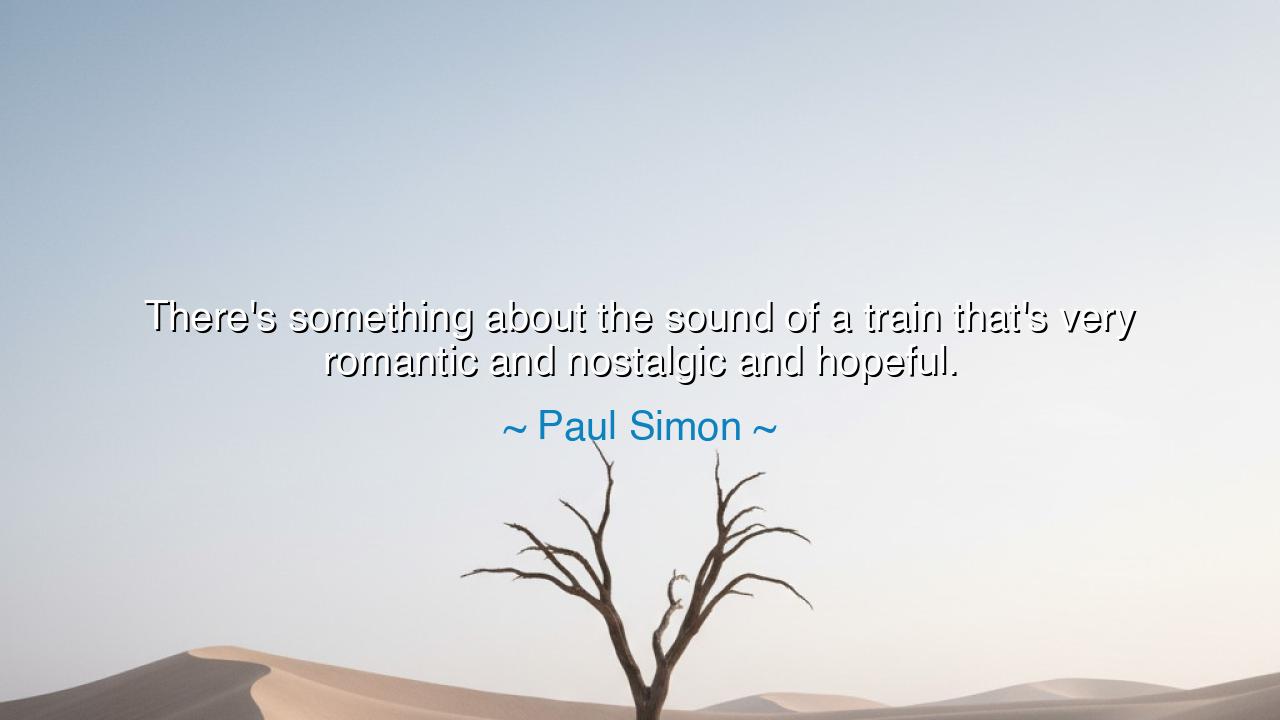
There's something about the sound of a train that's very romantic
There's something about the sound of a train that's very romantic and nostalgic and hopeful.






The musician and poet Paul Simon once said: “There’s something about the sound of a train that’s very romantic and nostalgic and hopeful.” In this simple reflection, he touches upon one of the great symbols of modern life—the train, that iron beast which carries men and women across vast distances, and in doing so, awakens within them dreams, memories, and longings. The sound of a train is not merely mechanical; it is a rhythm that stirs the heart. It is the voice of departure and of return, of journeys begun and journeys yet to come.
The romantic power of the train lies in its mystery. Each whistle that echoes into the night carries with it stories unseen: lovers parting, wanderers chasing fortune, families bound together, and strangers sitting side by side, united for a fleeting span of miles. The sound stirs the imagination, for it speaks of adventure, of stepping into the unknown. In its song, we hear the eternal human desire to seek, to wander, to hope.
At the same time, the sound is nostalgic. It calls us back to an earlier age, when railroads were the lifeblood of nations, and towns sprang up where tracks were laid. In the nineteenth century, when America was young and the frontier vast, the train’s whistle marked the pulse of progress and the longing of hearts. Families would stand at the platform, waving handkerchiefs, watching their loved ones disappear into the horizon. The sound of the train became the sound of memory—of days gone, of letters written, of promises whispered across distance.
History gives us many tales of how trains carried not only bodies, but dreams. Think of Abraham Lincoln’s funeral train, which wound its way across the United States in 1865, carrying his body back to Springfield. Along its route, thousands gathered, listening as the train passed by, its mournful sound becoming a hymn of grief and unity. For them, the sound of the train was not only nostalgic, but also hopeful—a promise that even in death, the vision of unity and freedom would endure.
For Simon, and for all of us, the train embodies hope because it suggests movement forward. The rails stretch into the distance, and the sound tells us: there is another town, another chance, another beginning. Even if life has been heavy, the train’s cry is a reminder that the road is long, and that tomorrow offers something new. This is why so many songs, poems, and stories are woven around the train—it is the herald of destiny, the song of possibility.
The lesson is clear: listen for the trains in your own life, not just of steel and iron, but of opportunities and callings. When you hear them, do not ignore their sound. The romantic heart will follow them, the nostalgic soul will remember where they have been, and the hopeful spirit will see where they can go. Life is not meant to be spent standing forever on the platform; it is meant to be a journey across new horizons.
So, beloved listener, embrace the wisdom hidden in Simon’s words. When the train calls, board it. Seek new places, new people, new stories. Let the sound of it remind you of the loves you have cherished, the hopes you still carry, and the adventures that await. For indeed, there is something in the sound of a train that belongs to every human soul—it is the song of the past, the present, and the future, echoing together as one.






AAdministratorAdministrator
Welcome, honored guests. Please leave a comment, we will respond soon